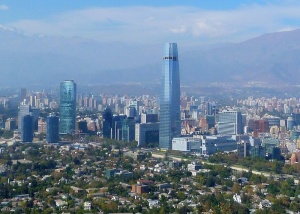WTTC criticises Latin America for failure to develop tourism infrastructure

Latin America is set to miss out on economic and social benefits from tourism unless it invests sufficiently in its lagging infrastructure.
That is according to World Travel & Tourism Council president David Scowsill, who stresses that weaknesses in the current state of tourism infrastructure in Latin America pose a threat to realising the growth potential of the sector within the region.
A new report, entitled “Travel & Tourism investment in the Americas: Will the region’s infrastructure and investment constrain or support future industry growth?”, states many countries in Latin America are not on track to invest enough to address current infrastructure deficiencies and it will cost the region heavily in terms of economic contribution and jobs.
Launching the report this morning, Scowsill said this should be a significant concern if the region wants to remain competitive on the world stage.
He explained: “The current state of tourism related infrastructure within Latin America is relatively poor compared with many mature tourism economies.
“Forecasts of tourism demand are greater than forecasts of tourism investment growth.
“This means there is a strong possibility the sector’s growth within parts of the region over the next decade will be limited.
“Given the large footprint and growing dependence on tourism within much of the region, the ongoing development of and support for the sector will be central to the future broader economic prosperity of Latin America.”
WTTC’s report shows a strong link between the quality and capacity of a country’s tourism related infrastructure and the realisation of the benefits of the sector.
WTTC forecasts that US$46billion will be invested in tourism in Latin America over the next decade.
However, with the annual growth in tourism investment forecast to grow by an average of 5.2 per cent per annum and the lagging state of current infrastructure, the research suggests that the forecast investment will not be enough to sustain and support future demand.
The report identifies countries including Colombia, El Salvador, Nicaragua and Venezuela as being particular concerns at not having the necessary quality and capacity of infrastructure to meet future demand.
As a result, they are pinpointed as countries where tourism is likely to contribute less to the economy and create fewer jobs, than current forecasts predict.
Current tourism infrastructure standards in countries including Colombia and Argentina are rated as particularly poor.
Countries including Chile and Mexico are described in the report as having relatively weak current infrastructure, but with strong tourism investment forecast over the next decade.
This means they are more likely to realise current growth predictions.
The report identifies countries including Argentina, Brazil and Ecuador as having a good balance between demand forecasts and their investment plans, making them well-placed to achieve their current growth forecasts.
Some star investors are also highlighted, including Costa Rica and Panama, as having a comparatively high quality of tourism infrastructure and strong investment growth forecasts for the coming years.
Launching the report, Scowsill emphasises why investment is of critical importance: “Firstly, countries need to maintain and grow their market share from their competitors and appeal to evolving consumer tastes.
“They need to build, upgrade and expand visitor facilities.
“Secondly, they need to increase airport capacity, as insufficient capacity can lead to bottlenecks and a limit on growth, as well as an upward pressure on prices which will affect competitiveness.
“Thirdly, visitor attraction capital projects should be considered as a way of generating additional demand.”
Scowsill said investors and companies from all over the world will be looking for opportunities to invest and governments need to act; “With confidence being restored to the financial sector, Latin American countries have a crucial chance to attract much needed investment for tourism infrastructure.
“Governments within the region need to ensure that they are an attractive location for this investment.”

